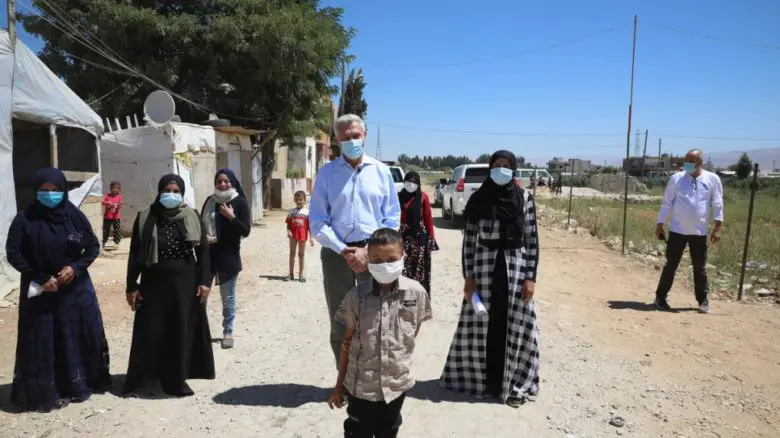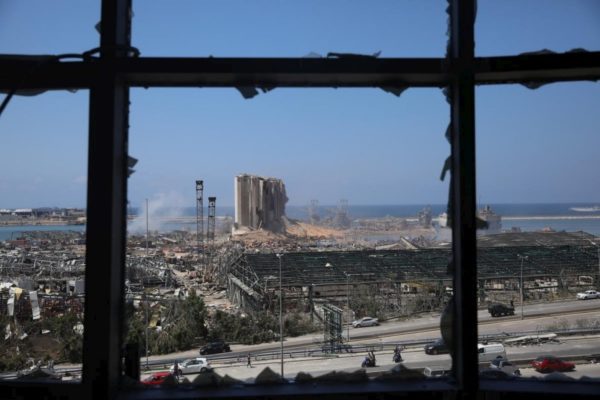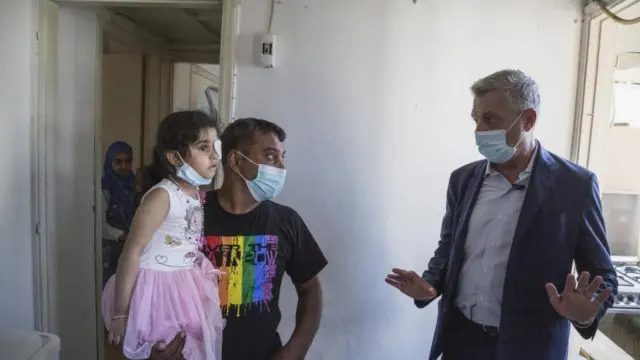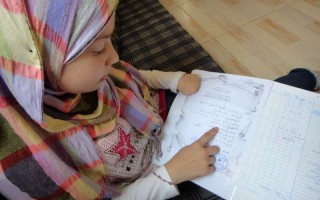
UN High Commissioner for Refugees, Filippo Grandi, poses for a photograph with a group of refugee women in a tented settlement in the Bekaa Valley, Lebanon. © UNHCR/Houssam Hariri
With country reeling from Beirut explosion, COVID-19 and financial crisis, UNHCR Head calls on global community to support Lebanon and its large refugee population.
UN High Commissioner for Refugees Filippo Grandi concluded a visit to Lebanon by calling on the international community to support the country in its hour of need, as it faces “an almost perfect storm” of financial crisis, COVID-19 outbreak and the aftermath of the devastating port explosion in the capital Beirut.
During his first field mission since the start of lockdown, Grandi met families in Beirut affected by the blast, visited a COVID-19 isolation facility and hospital extension in the north of the country set up by UNCHR, the UN Refugee Agency, to help respond to the pandemic.
He also spoke to families gravely impacted by the economic crisis, which has led to a rise in poverty and hardship for many Lebanese as well as the country’s large refugee population.
“This is a country that for more than 70 years has hosted millions of refugees, Palestinians, Iraqis and now of course the very large Syria situation. But Lebanon is also now in its own hour of need,” Grandi said. “This is a situation of an almost perfect storm… all those crises are hitting Lebanon at the same time.”
“At this moment, it is important that the world stands next to Lebanon and provides the humanitarian support that its people, and of course the refugees, need to stand on their feet again,” he added. “We need to act quickly, mobilize resources [and] help communities… so that this can at least reduce the acute suffering of so many people that I have visited in the past couple of days.”
“We live in circumstances I cannot describe.”
Among those he met was Khalil Ibrahim, a 38-year-old refugee from rural Aleppo in Syria who fled to Lebanon in 2013 and settled in the Bekaa Valley. He was left injured and unable to earn an income following a fall at work where he used to make tiles.
With mounting expenses and debts amid the deepening financial crisis, which in recent months has increased the share of refugees in Lebanon living below the poverty line from 55 to 75 per cent, the family is forced to rely on the earnings of their eldest daughter Nahed, 12, who left school in order to pick vegetables with her mother at a local farm for around US$2 per day each.
“I took my daughter out of school because we live in circumstances I cannot describe,” Khalil said. “It was a very difficult decision. I am the father of the house; I am the one who is supposed to be bringing an income.”
Khalil said the economic crisis has led to an increase in prices while COVID-19 restrictions means there is no work for his wife and daughter, forcing him to take on more debt that he has no means of repaying.
“Due to the coronavirus pandemic, work has become non-existent,” he explained. “Rent, electricity, water – all these are things we have to pay for at the end of each month. With these high prices, I am forced to borrow.”
UNHCR has expanded as much as it could the cash assistance it provides to the most vulnerable refugee families to help them cope with the inflation and financial impact of the COVID-19 restrictions, which have made it impossible for many to earn anything during lockdown.
“With the limitations on movement… the very meagre income of so many of the refugees – but also, frankly, of so many Lebanese – has disappeared,” Grandi said.
“This is why it’s important to put in place social safety nets, and big institutions are working on this at the macro level, and we and the World Food Programme and Unicef are working also with Lebanese and refugees to try on a humanitarian level, at least, to overcome this very acute phase the hardship.”
“I just want to have a modest life.”
However, needs are immense and humanitarian aid can only cover a fraction of the overall requirements.
For Khalil, he simply hopes that the family can find a way out of its current predicament and Nahed and her siblings can enjoy a normal childhood.
“I hope my daughter will see happy days and I hope she continues her education,” Khalil said. “I want my children to have a good life, not even the best life, I just want to be able to dress them in nice clothes. I don’t want to be rich. I just want to have a modest life.”
You can contribute to UNHCR’s relief efforts in Beirut here
Originally published by UNHCR on 25 August 2020





